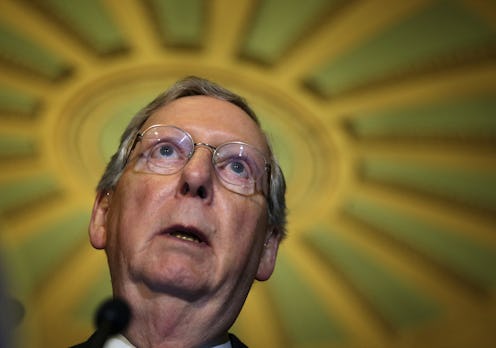News
Senate Goes Nuclear On The Filibuster
Remember when Sens. Harry Reid and Mitch McConnell worked together to craft an Obamacare compromise and reopen the government? Yeah, well, those days are over. Now, the two are locking horns over a fundamental Senate rule that Reid says is causing massive inefficiency: on Thursday, Reid invoked the so-called "nuclear option" to eliminate the minority party's ability to filibuster presidential nominees, other than Supreme Court picks. The change was approved by a vote of 52 to 48 shortly after noon on Thursday, much to Republicans' dismay. But really: You know things are bad when even the leaders of the federal government's least efficient branch are worried about it becoming obsolete.
"It's time to get the Senate working again," Reid said. "Not for the good of the current Democratic majority or some future Republican majority, but for the good of the United States of America. It's time to change. It's time to change the Senate before this institution becomes obsolete."
The battle came after Republicans blocked three of President Barack Obama's nominees to the D.C. federal circuit court, an important court of appeals. The proposal needed only 51 votes to clear the Senate because of the nuclear option (typically, such changes require more than two thirds approval), and now will allow presidential nominees to be confirmed with a simple majority than the filibuster-proof 60 votes. Because, really, someone had better get confirmed quick: the battle over the nominations is devolving into charges of racism.
Then again, this was not the first time Reid has threatened to use the nuclear option this year. Like the boy who cried wolf, Reid exceeded the number of times he could make that claim and be taken seriously: Sen. John McCain said that he's listening, and taking Reid's threats "seriously, but I've heard it a couple of times before." So really, it was time for Reid to make a move.
McConnell responded to Thursday's developments by saying that this was something Democrats vehemently opposed when the roles were reversed. "When Democrats were in the minority they argued strenuously for the very thing they now say we will have to do without, namely the right to extend a debate on lifetime appointments," he said. "In other words they believe that one set of rules should apply to them and another set to everybody else." A fair claim, perhaps, but this had to happen sometime. Republicans can strike back when (if?) they reclaim the presidency.
There's also no overstating just how bad things are for Congress right now. It's never been a popular branch of government, but its approval rating hit the single digits recently: 9 percent. So, though critics point to broken promises about rule changes, it seems like Reid had no choice but to act.
